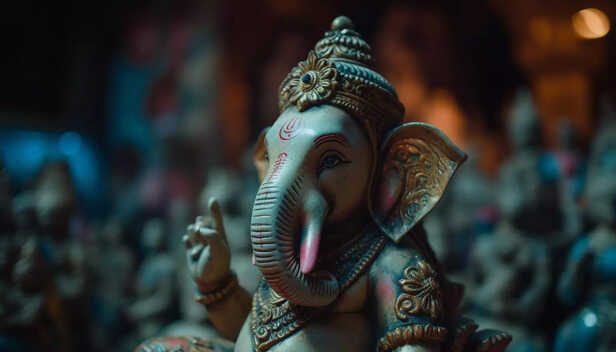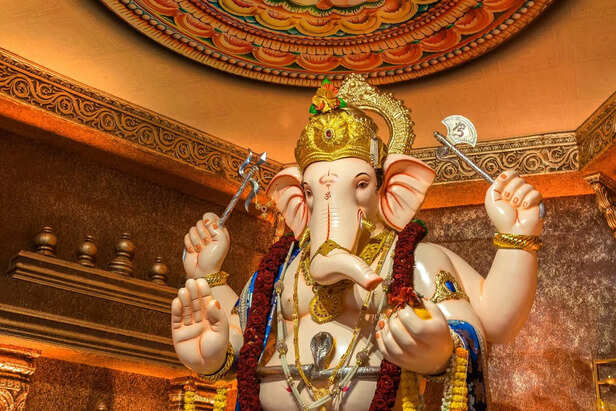Why Lord Ganesh Is Worshipped Before Every Auspicious Work
Riya Kumari | Jun 26, 2025, 17:01 IST
Ganesha
( Image credit : Pexels )
Faith is a vibe. It grounds us, gives our anxieties a designated inbox, and lets us pretend—if only for a moment—that the universe has a plan, and it’s not just one big group chat with zero moderators. Ganesh reminds us to begin well. That before the hustle, the hype, and the “hustle harder” Instagram quotes, there’s value in a pause. A prayer. A deep breath.
We all want things to go well. The first step of any journey—new job, marriage, home, exam, business—feels full of hope, full of nervousness. And whether we admit it or not, we want to feel like we’ve done something—anything—to give ourselves a better chance. That’s where Ganesh comes in. Worshipping Lord Ganesh before any auspicious work isn’t just “what we do” in Hindu tradition. It’s not a superstition or just another step in a longer to-do list of rituals. It’s an act of inner alignment. A way of saying: “Let me clear the path—within and around me—before I move forward.”
The God of Beginnings, Not Just in Myth but in Mind

In every temple, in every prayer, Lord Ganesh comes first. But this isn’t about blind hierarchy. It's psychological. It's deeply symbolic. Ganesh is known as Vighnaharta—the remover of obstacles. But obstacles aren’t always fallen trees on the road. Sometimes they’re fear. Doubt. Restlessness. Ego. Confusion.
We pray to Ganesh not just to fix the world outside—but to make space within us for what we want to do, who we want to become, and where we hope to go. Before anything can begin, the unnecessary must move. Ganesh is the god who moves what no longer belongs.
Why Him? Because He’s All of Us, In Symbolic Form

Ganesh has an elephant head, a human body, rides a mouse, and has a broken tusk. On paper, it sounds like a surreal painting. But look closely, and you’ll see yourself.
You Don’t Just Begin with Him, You Begin With Yourself

Let’s be honest. We all want our lives to move forward. But how often do we pause to ask: Am I truly ready? Not practically. But mentally. Spiritually. Emotionally. Worshipping Ganesh is a ritual. Yes. But more than that, it’s an invitation. To clean up the space inside us before we take the next step.
It’s less about a god “fixing” things and more about remembering: Clarity before action. Stillness before movement. Intention before execution. In a world obsessed with rushing—Ganesh reminds us to prepare.
Faith That Grounds, Not Escapes

Worship isn’t weakness. It’s awareness. When you bring Ganesh into your beginnings, you’re not saying “I give up control.” You’re saying: “I accept that there are forces I can’t see, fears I don’t understand, and habits I haven’t yet outgrown. Help me clear them, so I may begin without baggage.”
This kind of humility is power. It’s what protects good intentions from becoming chaotic results.
So Why Ganesh First? Because What You Start With... Shapes Everything After
Start a journey with confusion, and it stays confused. Start a relationship with ego, and it ends in silence. Start a task without clarity, and it drains more than it gives. But start with Ganesh—and you begin from a place of wisdom, humility, focus, and surrender.
And that changes everything. We don’t pray to avoid failure. We pray to avoid waste. We don’t call Ganesh to guarantee success. We call him so that whatever happens—success or challenge—finds us ready. Because the real obstacle isn’t the world outside. It’s our fear of it. And Ganesh, in all his symbolic grace, removes that first.
The God of Beginnings, Not Just in Myth but in Mind

Puja
( Image credit : Freepik )
In every temple, in every prayer, Lord Ganesh comes first. But this isn’t about blind hierarchy. It's psychological. It's deeply symbolic. Ganesh is known as Vighnaharta—the remover of obstacles. But obstacles aren’t always fallen trees on the road. Sometimes they’re fear. Doubt. Restlessness. Ego. Confusion.
We pray to Ganesh not just to fix the world outside—but to make space within us for what we want to do, who we want to become, and where we hope to go. Before anything can begin, the unnecessary must move. Ganesh is the god who moves what no longer belongs.
Why Him? Because He’s All of Us, In Symbolic Form

Ganesha
( Image credit : Freepik )
Ganesh has an elephant head, a human body, rides a mouse, and has a broken tusk. On paper, it sounds like a surreal painting. But look closely, and you’ll see yourself.
- The elephant head is wisdom. It reminds us to think big, think deep.
- The small eyes ask us to focus.
- The large ears teach us to listen more.
- The mouse, his vehicle, shows us that even the smallest can carry the biggest—if the mind is right.
- The broken tusk? It’s a lesson in sacrifice. That sometimes, to do what matters, something has to be let go.
You Don’t Just Begin with Him, You Begin With Yourself

Puja
( Image credit : Freepik )
Let’s be honest. We all want our lives to move forward. But how often do we pause to ask: Am I truly ready? Not practically. But mentally. Spiritually. Emotionally. Worshipping Ganesh is a ritual. Yes. But more than that, it’s an invitation. To clean up the space inside us before we take the next step.
It’s less about a god “fixing” things and more about remembering: Clarity before action. Stillness before movement. Intention before execution. In a world obsessed with rushing—Ganesh reminds us to prepare.
Faith That Grounds, Not Escapes

Lord Ganesh
( Image credit : Pexels )
Worship isn’t weakness. It’s awareness. When you bring Ganesh into your beginnings, you’re not saying “I give up control.” You’re saying: “I accept that there are forces I can’t see, fears I don’t understand, and habits I haven’t yet outgrown. Help me clear them, so I may begin without baggage.”
This kind of humility is power. It’s what protects good intentions from becoming chaotic results.
So Why Ganesh First? Because What You Start With... Shapes Everything After
And that changes everything. We don’t pray to avoid failure. We pray to avoid waste. We don’t call Ganesh to guarantee success. We call him so that whatever happens—success or challenge—finds us ready. Because the real obstacle isn’t the world outside. It’s our fear of it. And Ganesh, in all his symbolic grace, removes that first.
